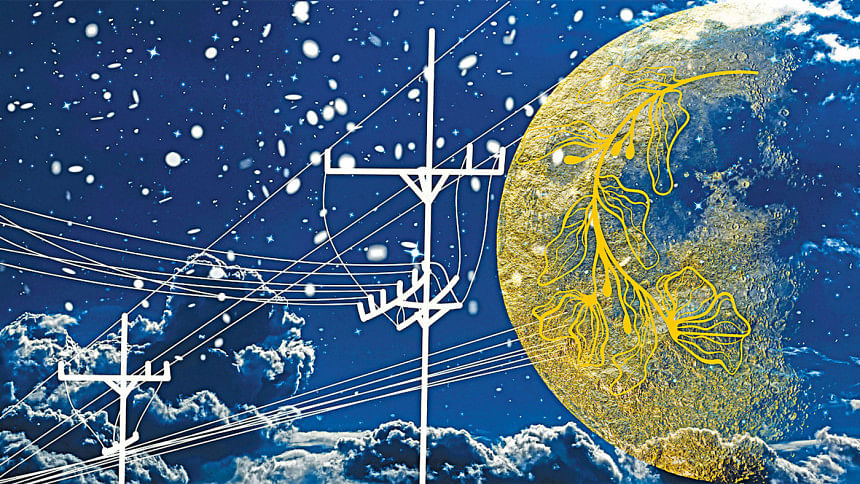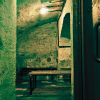The apocalypse is already here

From A Handmaid's Tale (McClelland and Stewart, 1985) to The Hunger Games (Scholastic, 2008), most dystopian novels tend to set their apocalypse in an undisclosed future from the time they were written in. With our news feeds showing us mind-numbing images of human savagery every single day, it begins to feel like we're already living in the end times, and horror writers certainly have their work cut out for them.
Three years ago, Bangladesh experienced a country-wide power outage that lasted less than 24 hours, and anyone who was around at that time will recall the panic and mayhem that ensued, so soon after we had emerged from a global pandemic. It was a sobering illustration of just how dependent we have become on modern technology, and how limited our survival skills have become—a feeling reinforced earlier last year during the July revolution when the AL government shut down the internet and imposed a media blackout.
While these are nightmarish situations for many of us, these are realities for many communities within our borders and across the world. And this forms the basis of Waubgeshig Rice's speculative fiction.
Moon of the Crusted Snow takes place in an isolated Ojibwe community in Northern Ontario. It is late fall. Snow is imminent. A sudden disruption of the electricity, cell phone service, and internet takes them by surprise. At first, these outages seem typical of the unreliable services provided by the authorities 'down south'. Days go by, however, and neither power nor communications are restored. Days turn into weeks and gradually it becomes clear that something apocalyptic has happened.
In a twist on the popular post-apocalyptic narrative, the novel focuses on an indigenous community's response to a worldwide calamity. The outages and resulting loss of modern amenities draws a stark line between those who have retained traditional hunter-gatherer skills and those who have not. As winter deepens, and emergency food supplies dwindle, those less equipped to survive die off and their frozen bodies are piled in a makeshift morgue. Further tensions are precipitated by the arrival of Justin Scott, a white refugee, whose snowmobile trailer contains liquor and guns. In true white man fashion, Scott tries to assume leadership of the community. Interspersed within the terrifyingly mundane details of the community's slow decline into chaos and violence are flashes of the supernatural—dreams and visions that feel like prophecies, old cautionary tales told by the elders, all adding an eerie quality to an already horrific situation.
Rice's novel uses the post-apocalyptic setting to celebrate the resilience of indigenous people and to explore the challenges and possibilities of indigenous resurgence. He crafts a rich and full portrait of his community in a humble and direct style, the experience of reading which would remind readers of the tone and tenor of the "Drama in Real Life" stories from Readers Digest back in the '90s.
There has been some complaint among readers about the lack of exposition regarding the inciting incident of the novel, i.e., the calamity that caused the outages, a conceit reminiscent of Cormac McCarthy's The Road (Alfred A. Knopf, 2006); the book does not explain the calamity that has led to the setting. This sharpens the focus on the reactions of the characters, which serves some good novelistic purposes. For me, personally, the conceit works: The eerie 'jovial bully' personality of Justin Scott displays a creepiness similar to Stephen King's books. For a subjugated people, the 'why' of certain abuses that have happened becomes less important than the fact that they happened at all. One way to read the post-apocalyptic aspect of the novel is as an expression of how difficult indigenous resurgence is in present-day Canada, or really anywhere where indigenous communities have been relegated to minority status. In the wake of the ongoing turmoil in the CHT, this becomes a particularly relevant consideration for Bangladeshi readers.
The novel offers an engaging glimpse into the challenges of the Ojibwe people, who have been displaced by the white settlers. "Our world isn't ending. It already ended", laments one of the characters, a community elder. He continues: "It ended with the Zhaagnaash came into our original home down south on that bay and took it from us. That was our world. When the Zhaagnaash cut down all the trees and took our fish and forced us out of there, that's when our world ended."
The opposing forces of forced assimilation and a struggle to retain the cultural identity in the face of 'progress', are rendered moot by the arrival of the apocalypse. How to pass on Ojibwe traditions in the face of the distractions of modern life is no longer an issue when modern life no longer exists?
In a world where an ongoing genocide has become an accepted background noise, where climate change continues to wreak havoc on every day life while political leaders pursue their usual rhetoric, a novel like Moon of the Crusted Snow doesn't need to work too hard to be absolutely terrifying, and I for one, cannot wait to read the sequel.
Sabrina Fatma Ahmad is a writer, journalist, and the founder of Sehri Tales.

 For all latest news, follow The Daily Star's Google News channel.
For all latest news, follow The Daily Star's Google News channel. 







Comments